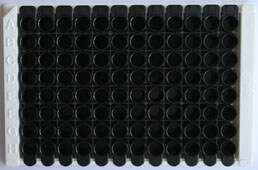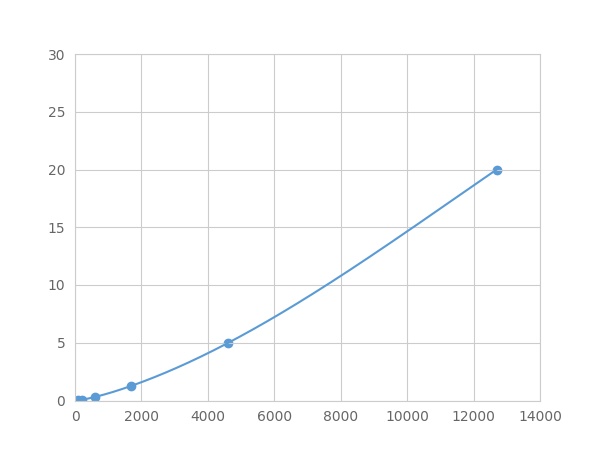Packages (Simulation)

Reagent Preparation

Image (I)
Image (II)
Certificate


Multiplex Assay Kit for Macrophage Migration Inhibitory Factor (MIF) ,etc. by FLIA (Flow Luminescence Immunoassay)
GIF; GLIF; MMIF; Glycosylation-Inhibiting Factor; L-dopachrome isomerase; L-dopachrome tautomerase; Phenylpyruvate tautomerase
(Note: Up to 8-plex in one testing reaction)
- Product No.LMA698Hu
- Organism SpeciesHomo sapiens (Human) Same name, Different species.
- Sample Typeserum, plasma, tissue homogenates, cell lysates, cell culture supernates and other biological fluids
- Test MethodDouble-antibody Sandwich
- Assay Length3.5h
- Detection Range0.02-20ng/mL
- SensitivityThe minimum detectable dose of this kit is typically less than 0.007 ng/mL.
- DownloadInstruction Manual
- UOM 8Plex 7Plex 6Plex 5Plex 4Plex 3Plex 2Plex1Plex
- FOB
US$ 393
US$ 408
US$ 431
US$ 461
US$ 491
US$ 537
US$ 605
US$ 756
Add to Price Calculator
Result
For more details, please contact local distributors!
Specificity
This assay has high sensitivity and excellent specificity for detection of Macrophage Migration Inhibitory Factor (MIF) ,etc. by FLIA (Flow Luminescence Immunoassay).
No significant cross-reactivity or interference between Macrophage Migration Inhibitory Factor (MIF) ,etc. by FLIA (Flow Luminescence Immunoassay) and analogues was observed.
Recovery
Matrices listed below were spiked with certain level of recombinant Macrophage Migration Inhibitory Factor (MIF) ,etc. by FLIA (Flow Luminescence Immunoassay) and the recovery rates were calculated by comparing the measured value to the expected amount of Macrophage Migration Inhibitory Factor (MIF) ,etc. by FLIA (Flow Luminescence Immunoassay) in samples.
| Matrix | Recovery range (%) | Average(%) |
| serum(n=5) | 78-92 | 82 |
| EDTA plasma(n=5) | 80-92 | 81 |
| heparin plasma(n=5) | 97-104 | 101 |
| sodium citrate plasma(n=5) | 95-105 | 101 |
Precision
Intra-assay Precision (Precision within an assay): 3 samples with low, middle and high level Macrophage Migration Inhibitory Factor (MIF) ,etc. by FLIA (Flow Luminescence Immunoassay) were tested 20 times on one plate, respectively.
Inter-assay Precision (Precision between assays): 3 samples with low, middle and high level Macrophage Migration Inhibitory Factor (MIF) ,etc. by FLIA (Flow Luminescence Immunoassay) were tested on 3 different plates, 8 replicates in each plate.
CV(%) = SD/meanX100
Intra-Assay: CV<10%
Inter-Assay: CV<12%
Linearity
The linearity of the kit was assayed by testing samples spiked with appropriate concentration of Macrophage Migration Inhibitory Factor (MIF) ,etc. by FLIA (Flow Luminescence Immunoassay) and their serial dilutions. The results were demonstrated by the percentage of calculated concentration to the expected.
| Sample | 1:2 | 1:4 | 1:8 | 1:16 |
| serum(n=5) | 85-99% | 78-91% | 92-102% | 85-97% |
| EDTA plasma(n=5) | 91-98% | 81-96% | 78-94% | 86-95% |
| heparin plasma(n=5) | 80-90% | 87-95% | 88-101% | 91-98% |
| sodium citrate plasma(n=5) | 79-104% | 80-104% | 99-105% | 79-94% |
Stability
The stability of kit is determined by the loss rate of activity. The loss rate of this kit is less than 5% within the expiration date under appropriate storage condition.
To minimize extra influence on the performance, operation procedures and lab conditions, especially room temperature, air humidity, incubator temperature should be strictly controlled. It is also strongly suggested that the whole assay is performed by the same operator from the beginning to the end.
Reagents and materials provided
| Reagents | Quantity | Reagents | Quantity |
| 96-well plate | 1 | Plate sealer for 96 wells | 4 |
| Pre-Mixed Standard | 2 | Standard Diluent | 1×20mL |
| Pre-Mixed Magnetic beads (22#:MIF) | 1 | Analysis buffer | 1×20mL |
| Pre-Mixed Detection Reagent A | 1×120μL | Assay Diluent A | 1×12mL |
| Detection Reagent B (PE-SA) | 1×120μL | Assay Diluent B | 1×12mL |
| Sheath Fluid | 1×10mL | Wash Buffer (30 × concentrate) | 1×20mL |
| Instruction manual | 1 |
Assay procedure summary
1. Preparation of standards, reagents and samples before the experiment;
2. Add 100μL standard or sample to each well,
add 10μL magnetic beads, and incubate 90min at 37°C on shaker;
3. Remove liquid on magnetic frame, add 100μL prepared Detection Reagent A. Incubate 60min at 37°C on shaker;
4. Wash plate on magnetic frame for three times;
5. Add 100μL prepared Detection Reagent B, and incubate 30 min at 37°C on shaker;
6. Wash plate on magnetic frame for three times;
7. Add 100μL sheath solution, swirl for 2 minutes, read on the machine.
GIVEAWAYS
INCREMENT SERVICES
| Magazine | Citations |
| Kidney International | Targeted reduction of advanced glycation improves renal function in obesity PubMed: 21412218 |
| The Journal of Immunology | Macrophage Migration Inhibitory Factor Plays a Role in the Regulation of Microfold (M) Cell-Mediated Transport in the Gut Jimmunol: 5673 |
| The Journal of Endocrinology | Involvement of exercise-induced macrophage migration inhibitory factor in the prevention of fatty liver disease PubMed: PMC3757527 |
| The Journal of Immunology | Role of macrophage migration inhibitory factor in the regulatory T cell response of tumor-bearing mice PubMed: PMC3466372 |
| Diabetologia | Deletion of bone-marrow-derived receptor for AGEs (RAGE) improves renal function in an experimental mouse model of diabetes Pubmed:24957662 |
| BioMed Research International | The Potential Role of Polymethyl Methacrylate as a New Packaging Material for the Implantable Medical Device in the Bladder PubMed: 25705692 |
| Diabetologia | Combined NOX1/4 inhibition with GKT137831 in mice provides dose-dependent reno- and atheroprotection even in established micro- and macrovascular disease. pubmed:28160092 |
| Life Sciences | Protective effect of chlorogenic acid on the inflammatory damage of pancreas and lung in mice with l-arginine-induced pancreatitis pubmed:28919396 |
| Scientific Reports | Cytokine MIF Enhances Blood-Brain Barrier Permeability: Impact for Therapy in Ischemic Stroke Pubmed:29335619 |
| Ocular Immunology and Inflammation | Immune Response and Mechanisms of IFN-γ in Administration for Keratomycosis Pubmed: 30307777 |
| International Journal of Immunopathology and Pharmacology | Effect of voluntary running on expression of myokines in brains of rats with depression Pubmed: 30834799 |
| Biomarkers in Heart Failure and Associated Diseases | Biomarkers in Heart Failure and Associated Diseases |
| Science China-Life Sciences | Autophagy mediates the secretion of macrophage migration inhibitory factor from cardiomyocytes upon serum-starvation Pubmed: 31209799 |
| Folia Morphologica | Beneficial effects of voluntary over forced exercise on skeletal muscle structure and myokines expression Pubmed: 31802473 |
| Biomed Pharmacother | Deletion of macrophage migration inhibitory factor ameliorates inflammation in mice model severe acute pancreatitis Pubmed: 32062385 |
| Sci Rep | Association between MIF gene promoter rs755622 and susceptibility to coronary artery disease and inflammatory cytokines in the Chinese Han population 33850223 |
| Commun Biol | Macrophage migration inhibitory factor is overproduced through EGR1 in TET2low resting monocytes Pubmed:35115654 |





